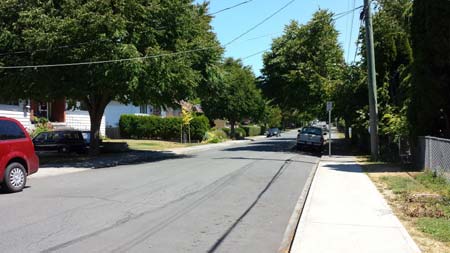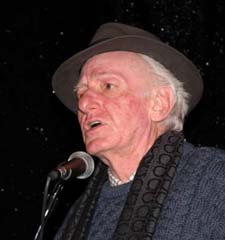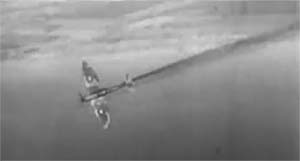From Oscar of Between, Part 26B Excerpt
by
Betsy Warland
“The interior of the rifle barrel was created with spiral grooves so the bullet revolved in the air as it left the gun. Because of this it offered great improvements in accuracy and range compared with the smoothbore musket …
A revolution in tactics followed.”

Photo credit: i.imgur.com
“… the bullet revolved in the air …”
“A revolution in tactics followed.”
Then, in 1942, the Nazis invented the MG 42 machine gun. It fired 1,200 to 1,500 rounds per minute.
Librairie Le Port de tête on Mont-Royal: Carla Harryman reading from her new book Adorno’s Noise, Gail Scott presiding. When Carla reads from final section, “Headless Heads,” Oscar reverberates, shifts in folding chair, spreads her knees apart to rest her forearms on tops of her thighs and looks down at the old pine floor. Carla’s piece riffing off everything from Max Ernst’s La femmes 100 têtes! to Blake’s “The Ghost of a Flea” to Richter’s painting “Betty” (his daughter the model for adult head on butcher’s paper). Oscar’s attention punctuated with the Luka Magnotta inquiry into the killing of Concordia student Lin Jin that began this week in Montreal. Magnotta charged with “mailing the body parts across the country.”

Betty
Painting by Gerhard Richter 1977
The depravity of this act.
On the second day of the inquiry, Lin Jin’s father is escorted from the courtroom due to an emission from his mouth: sobbing.
“The birth of modern camouflage was a direct consequence of the invention of the aeroplane.”
– aerial reconnaissance –
It’s now possible to make a detailed inventory of the enemy’s position, vehicles, artillery, number of soldiers.
– deception became the most lethal of weapons –
“This process led to a deadly game of hide-and-seek … each side disguise[d] any build-up … [to] retain the advantage of surprise before any major offensive.”
Summer of 1918, white kid-gloved dandy Parisian portraitist Lucien-Victor Guirand de Scevola becomes the first camoufleur (contrary to what British history maintains).
Eventually, he “oversaw numerous workshops along the Western Front employing 1,200 men and 8,000 women.”
She’s been hit — engine cuts out/propeller clock hands stop—skirmish recedes as Oscar spirals out of control (wings cutting through air only sound).
The Spitfire’s litheness mesmerizes Oscar as it gyres to the sea.
Together. They go down. Together.
This memory came out of the blue some twenty years ago.
Once, when she was hesitant to enter some teenage activity he was driving her to he gave her a tip:
“Just walk in like you belong there.”
Tactics. Her father knew. Gave this rare camo cue to Oscar.

Photo credit: Ryan Rock
Guest Writer:
Arleen Paré
Victoria, BC
Arleen Paré Web site
Arleen Paré on Facebook
this street is a strategy
an abode biding time
warp and weft west to the east
buying sockeye salmon on sale
at Fairfield Plaza Thrifty’s
one half block away
nails nail brushes from the Home Hardware store
and drugs at the Heart
this street is convenient a double-edge
near a place to convene in the aisles
impermanents and those who will never leave
welcome to the cult capital said the ferry cashier
rituals in the graveyard nearby
beyond conventions of home
homeyness hi honey homonyms ad hominums
almost homogenous high-ho high-ho
a river unlit from above a ruined Garry oak meadow
minus the camas minus the chocolate
lilies pink shooting stars bright yellow tips
that kind of damage the underside
of progress so called
when I first moved here eight years ago
the street was a siding a way station between worlds
a small human procession
moving at the rate of blood circulating around the human knee
bicycles and garbage trucks a march of roped children
braced singing
the wheels of the bus
though we see squirrels on fences and roof tops
we never see rats rats prefer saturation
back then everyone who walked past me
had a face in tones of blue-grey
they wore Satan’s horns on their heads
a never never land in isolation
not quite solace an island of island
solarization is the dark become light
light changes to dark
the inside-outedness of this vantage point
this particular place on the full-rounded globe
foreboding this second-floor bedroom window
is its own light its own void
who abides with me here on this block
on this two-way tar-track with no life-saving bumps
keeps their thoughts in their pockets
wires caught like fishing line in the katsura
cars short-cut the major arterial route
heedless of Hollywood Park located midway
heedless of deer moved down from the north
new to the street
and of wheelchairs from the far end
a never never land that intersects hooks at the end
onto the main thoroughfare which turn right turn left
heads off towards the bounded blue sea
*

Photo credit: Arleen Paré
this street is not
one uninterrupted block long
but three blocks unintersected it is not
three stories not layered not wedding cakes
or Black Forest or tales of Hoffman
though the Offenbachs live four houses down
and across
red arches at their feng shui door
where last month the mother
suddenly died and last year
the sister the father
still makes wooden soldiers
leafing gold onto their tiny lapels
this street is not a Hollywood movie
despite the midway eponymous park despite
its location on the west coast not
Cinderella’s glass slippers no glass houses or carports
no one means to throw stones
this street cannot pick-up and hitch-hike the long shoreline south
to the east after the strait has been straddled
the neighbours don’t have the right clothes
or clout the neighbours are not all that close
nor do they not want that kind of closure
this street offers no safe needle disposal sites
no steel yellow boxes affixed to utility poles
this street is not a flood of new ideas
not treeless nor full open to sky
not lacking in song-specific buff-coloured birds
or song-deprived crows not without its fixed-
delusional degenerate in wrap-around sunglasses
even in rain
it is not without a day care or optometrist
or amateur car mechanics book-ending the corners to the west
not without baseball fields or an old empty house
so far unhaunted
it is not a river and yet a river
runs through
under the drain in our basement
underneath the whole street
floats puddles oil stains cement
fishnet clumps of old root
it is not an island not technically on its way south
the street lamps do not illuminate the edges of dread
the light every night lost in deepest katsura
which every night tries to enter my window
it is not a haven no one owns a white picket fence
nor are there vegetables in every backyard
nor a chicken in every pot nor a ham
some neighbours the odds dictate
will be vegetarian
*
across the street a stay-at-home mum
her children grown-up almost gone
polishes the silver
hood of the family’s new truck
telephones us when a tree topples in wind
911’s when the old man next door falls
over his own creepy delusions
she watches for cars that don’t belong
for felled branches noxious weeds noises
small fissures in the street’s presentation
*
curving south toward water toward Fairfield Road
the pavement divided
all maps road-lined solid black
while the sound of a river
while native grasses try to restore interrupt
all the lines on a map try to lead somewhere
away from this house the perspective north
aurora borealis unseen from city limits the pole star
*

Photo credit: Arleen Paré
I don’t mention
belonging having arrived only eight years ago
uncertain how neighbours perceive
the man missing
the children too
having no personal memory of former mayors
or restaurants over the years
or the infamous snowfall of 1996
the way we hold ourselves like gates
two other women moved in across the street
they own two black and white dogs
they erect an orange cat in the front window
personal credos table talk the kitchen table
from where most birds are seen
today one varied thrush
the river in rain
gurgles under the floor webbed and cracked
eye pressed to the concave metal grate
water rushing like it’s being chased see it mouth to the bars
blind perch with eyes bulging and water
beneath the old grated hole
the risk
all houses on this street
stand on the flow float inside their pale stucco crusts
I say this to no one: on this street
when the earthquake subducts there will be
liquefaction
we should move to a place on a rock
or live in a tent avoid roads
with a fridge and a desk
some solutions are superior
though not always obvious
not always linear or fast-moving as light
this is my place my eco-environment my now natural home
extension of self wilderness my surround
this is what happens when I open the blinds
the squirrels on the grey stucco wall words stanzas
seagulls heron racoons children in pairs
neighbours too black and white dogs the katsura
the orange cat growing large in the window
how wonderful we are in our being
a truck rumbles the road
the bed pulses and shakes

Photo credit: Janet Kvammen
Featured Reader:
Garry Ward
Vancouver, BC
I read Oscar’s Salon because
I started reading Oscar after hearing Betsy read excerpts at a workshop she gave in New Westminster. I find the work extremely compelling because of the power in its sparsity. There is a feeling of serene solitude that I feel when reading Oscar Salon that’s like listening to old Miles Davis late at night with the lights turned off. I rarely comment back, because I am usually at a loss for words after reading it.
Profile
Garry Ward is an old prairie farm boy who ran away from home in the late 60’s to join a rock-n-rock band. He began writing poetry in high school and his only book, “Watching the Sun Rise & Other Poems”, was largely written during his time in Saskatoon with a band called Screaming Lord Ward & the Whatnot. After moving to BC in the early 70’s, he studied poetry with the late Joan Buckley under whose mentorship he met the likes of Al Purdy, Earle Birney and Alan Ginsberg. After a few years of playing strip bars and seedy night clubs, he left music and writing and began a thirty-five year career in forestry, fatherhood and paying a mortgage. He has recently returned to writing and playing jazz under the cover of darkness. Garry is currently compiling a collection of jazz poems and compositions under the working title “Life After Midnight.”





Both pieces in the salon this month mention belonging. A father’s tip–“Just walk in like you belong there”–hints at the the opposite. The poet moves in to a neighbourhood, wonders what the neighbours think of this new outsider. Blending in to the environment. Everything and everyone belongs in camouflage.
Reading this month’s salon, I’m struck by how space shapes us as much as our interconnecting with one another. The seemingly nothing’s-going-on of an empty rifle barrel or quiet street are the necessary conditions for anything-can-happen-in-a-split-second ignitions of all kinds.
In those moments when we look at this blank comment box—consider whether or not to type something in (the why & what of this)—we are in that barrel, in the middle of that temporarily quiet street. Suspended. Utterly solitary, echoing Arleen’s line: “the way we hold ourselves like gates”
The excerpt is beautifully written!
https://spelledlikeeyes.wordpress.com